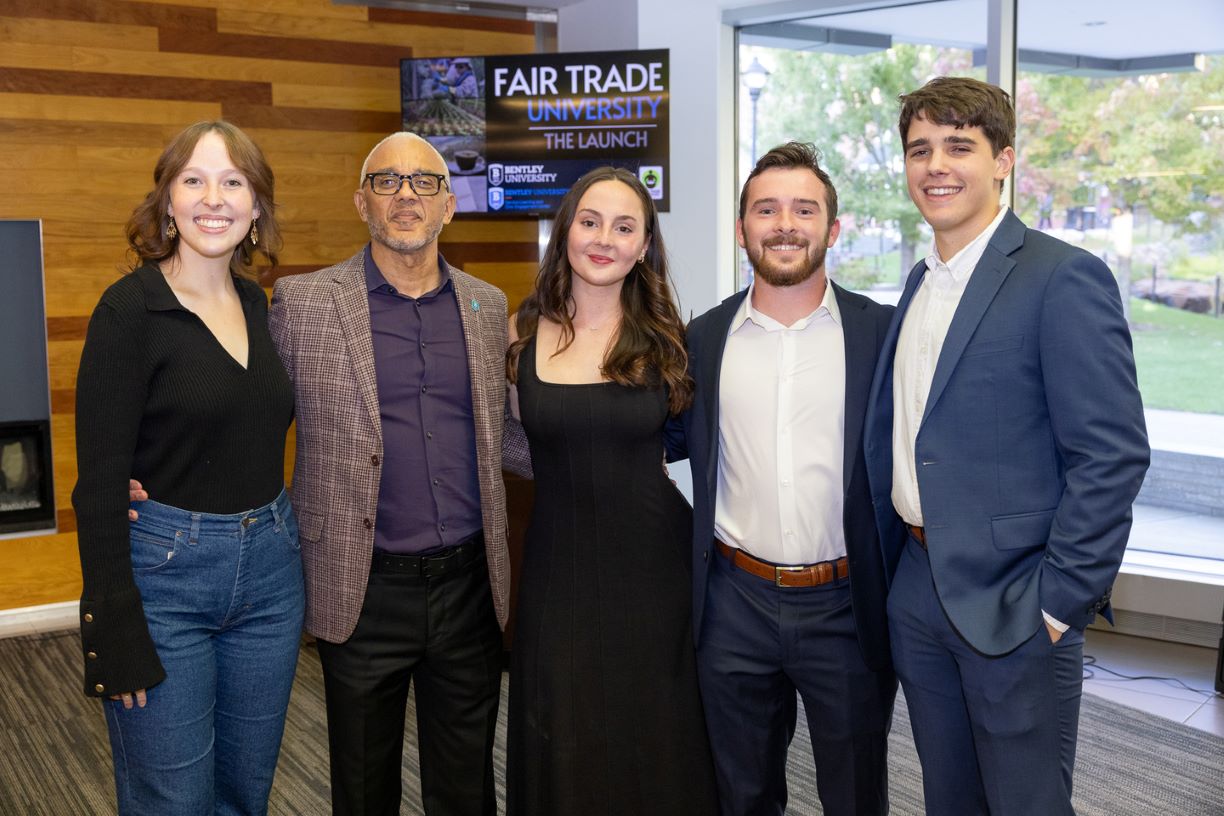
Bentley on Track to be the First Fair Trade-Certified U.S. Business University
Bentley is on track to be the first business university in the country to become a certified Fair Trade University. The news comes after students from the Bentley Service-Learning and Civic Engagement Center (BSLCE) made a pitch for Bentley to pursue the certification by including the necessary ethical and sustainable practices in the university’s curriculum, procurement and research efforts.
“The prospect of studying at a business school that helps us develop into leaders of ethical businesses, while instilling in us the knowledge and skills to do so, is what makes Bentley special,” said Luke Andris ’25, Caroline Bushnell ’25, Cassie Dubitsky ’24 and Trevor Hodgson ’25 in their proposal. “We believe business should be ethical, we believe business should be fair and we believe in our ability as student leaders to effect positive change.”
President E. LaBrent Chrite approved the resolution to pursue the certification, and it was announced during Fair Trade Month in October. It is the result of years of behind-the-scenes work by Bentley students, alumni, faculty and staff.
Jonathan White, BSLCE executive director and associate professor of sociology, and Bria Milbery, associate director of programs and initiatives in the BSLCE, are experienced advocates for fair trade practices. They have led students through on-campus initiatives such as the Fair Trade Fair — now in its 10th year and the second largest in the country, according to Fair Trade Certified — and the Fair Trade University certification process.
RELATED: Bentley Fair Trade Fair advocates for ethical business
“Fair trade is a business model that ensures we are valuing people and planet just as important — if not more important — than profit,” Milbery said. “It ensures that people are being paid fairly and that there is no child labor or slavery involved all the way up the supply chain.”
According to a nationwide Bentley-Gallup survey, 88% of Americans think companies should try and make the world better, with 72% saying they would pay more for a product from a company that treats its employees well.
“The conscious consumption movement is growing, and more people are seeing that consumers can collectively use their purchasing power to push businesses to favor the triple bottom line over bottom-line profit,” White said.
He sees that kind of social advocacy by BSLCE student leaders, including those who helped Milbery launch the Fair Trade Fair in 2014 and who first proposed the Fair Trade University certification process in 2015. “This is also a story about our students as civic leaders — business school students who are going to go out into the corporate world and represent a generation that wants to use business to help create a better world,” White says. “When we purchase fair trade products, they taste extra good because of their special ingredients: equity, fairness, planetary stewardship and justice.”

Pursuing Fair Trade University certification supports the university’s Falcons Forward 2030 Strategic Plan, including serving as a catalyst for business-driven impact and strengthening the university’s commitment to innovation.
“I’m proud that Bentley has a long tradition of mentoring fair trade on campus, however I’m even prouder that this effort has been primarily driven by students,” Chrite said during an on-campus launch event for the campaign. “The fair trade effort aligns with Bentley’s values. We believe in good business; and by that, I mean that business should deliver value to the marketplace as well as create lasting positive outcomes for our society.”
In a recorded message played during the event, Billy Linstead Goldsmith, senior director of Fair Trade Campaigns, said, “By launching this effort, Bentley is joining not only a vibrant community in the U.S. but also a global movement that includes many thousands of campaigns in over 30 countries around the world. In the U.S., Bentley stands to become the very first business school to earn this designation and become a Fair Trade University — and that’s particularly exciting for us as the fair trade model is one focused on demonstrating that business can and must be a force for good.”
What does it take to be a Fair Trade University?
Fair Trade Certified is the largest Fair Trade certifier in the U.S. Requirements to achieve Fair Trade University certification include:
- Starting a task force with at least five committee members, including at least one non-student
- Ensuring that a minimum of two certified Fair Trade products are available in all campus-owned and operated venues
- Providing at least three examples of campus offices, departments and/or campus-run meetings and events that use Fair Trade products
- Hosting at least four educational activities on campus related to Fair Trade each academic year to build awareness of Fair Trade on campus
- Passing a resolution in support of Fair Trade through the appropriate decision-making bodies on campus

